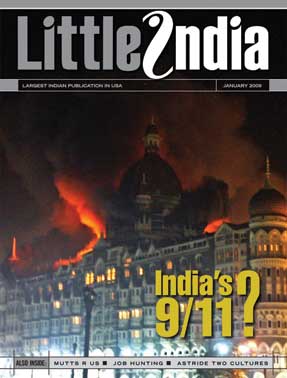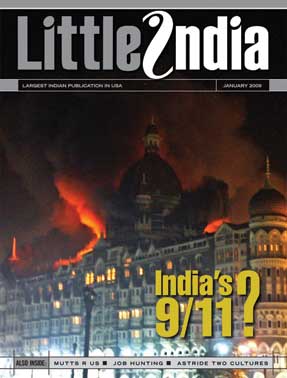Letters
Letters: Feb 2009

Letters: Feb 2009
|
I commend Little India for its coverage of the Mumbai attacks (“India’s 9/11,” January 2009). It is heartening that unlike George Bush’s America, Indians are responding to the tragedy in a measured way. With Barack Obama’s election, the lawless legacy of the Bush administration in the aftermath of 9/11 stands repudiated by the American people as well. The best way to defeat terrorists is to not be intimidated by them. Mumbaites have demonstrated that they can take these attacks in stride, unlike the Bush-Cheney administration, which for eight long years brought the American economy and its vaunted civil and political rights traditions to a screeching halt, for which America will pay a price for another generation at least.
J.C. Chand, Via eMail “Love Job Hunting” by Anu Sharma (January 2009) is an excellent article, demonstrating the strength of a positive mind. A confidence is reflected in its fullest glory in her well articulated words.
R.N. Watts, Via eMail I couldn’t have said it any bet-ter than Anu Sharma in “Love Job Hunting.” Her essay is right on the money. What a powerhouse this article is and the ending is exactly what I hope every one realizes: life is too short to lose time. We are such infinite individuals, seeking only happiness every day.
Ruby Munoz, Via eMail “Are Republicans right af-ter all?” asks Shekhar Deshpande (“Mutts R Us”, January 09), which speaks volumes about Pres. Barack Obama’s facile remarks. People elected him consciously, knowing well of his racial background. So, for him to say he doesn’t want mutts in the White House cannot be taken as a wisecrack that went awry. Small things sometimes morph into big issues and this is one example. Every presidential pronouncement is important and Obama cannot afford to disregard that axiom. The author’s backhand flick about the brouhaha over dogs and allergies — “The energy generated here could well fuel the sputtering economy,” is splendid. But the icing on the cake comes in the last sentence on presidential pronouncements — “Who knew this is the way we find out?”
Ashok Bhat, Iselin, NJ “The Indian Thing To Do,” by Seema Khaneja (December 2008) stirred me to think. She is right. Divorce is still a stigma in Indian society, but like many personal choices (this being a particularly difficult one, emotionally, physically and mentally), how best to cope is up to the individual. Societies and deep-seated values change slowly. But living in America and being financially independent makes it easier and allows women to not be as concerned about people’s reactions to their marital condition. No one should make you unhappier or feel guilty: Talking is their privilege, but not listening is yours. Exercise it.
Shalini K Narang, Via Email
Pres. Barack Obama’s reference to Hindus in his inaugural address is a new milestone in U.S. history. CBS, NBC, ABC, CNN and FOX never ever mention the word “Hindu or “Hinduism” in their evening news; they only mention Buddhism. It is quite a long way from the days when Hindus all over United States had to fight zoning board in cities for permission to construct Hindu temples in the 1970s and 1980s. I still recall the day when a CBS Atlanta radio station interviewed me to clear misconceptions after people objected to the construction of the Hindu temple in Atlanta. Considering that Hindus make up under one percent of the American population, the reference to Hindus as a valid and distinct group in Obama’s speech is very welcome news and a very notable departure from the eight years of Bush, when only evangelical Christians were valued.
Ed Viswanathan, Via Email Apropos Nilanjana Bhowmick’s article on Anglo Indians (August 2008): An Anglo Indian is a person whose father is of British or European origin. During the British Raj many elite Indians resided in England for higher education and some married British women. Their children became part of Indian society and did not consider themselves as half Indians. Many British soldiers married tribal women in Shillong, which was capital of Assam (presently Meghalaya). In Assam many British men were managers of tea estates, some of who married daughters of tea laborers. Their children were considered Anglo Indians. Some had fair skin and blue eyes. Quite a few did not pursue higher education. As a result, few of them attained high positions in the government service. A large number of Anglo Indians resided in the Park Circus area in Kolkata. Others settled in Bangalore, Mumbai, Chennai, etc. However, few settled in Delhi. Many Anglo Indians were employed as guards and drivers in the Eastern Railways. However, as Bhowmick noted, several of them such as Diana Hayden, Ruskin Bond, etc., became luminaries. Anglo Indians never participated in the Indian freedom struggle against the British government. After independence in 1947, large numbers of Anglo Indians migrated to England, Australia and other countries. But most hid their roots from the next generation.
Subimal Deb, Smyrna, Ga.
|


You must be logged in to post a comment Login